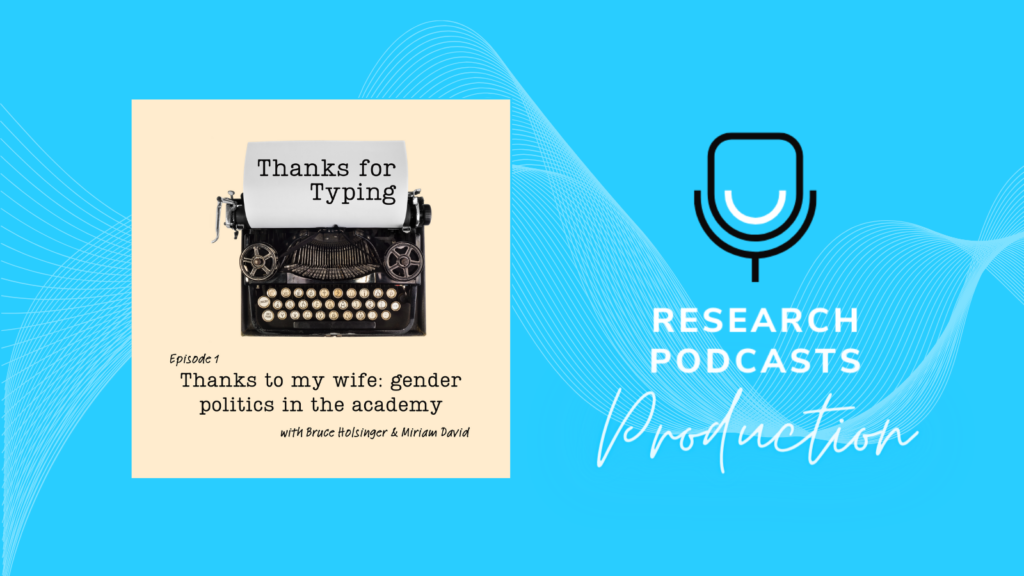
This week saw the launch of another Research Podcast production. In Thanks for Typing, social scientists Ros Edwards and Val Gillies spotlight the frequently invisible work done by researchers’ wives on landmark studies that laid the foundations of modern sociology.
- Listen to Episode 1 Thanks to my wife: gender and politics in the academy
Thanks for Typing shares revealing accounts of the contributions made by women to their academic spouses’ work – which frequently went far beyond the manuscript-typing and tea-making they were (sometimes) thanked for, and into the realm of primary research and analysis, translations, intellectual insights and co-authorship.
The podcast, produced by Chris Garrington at Research Podcasts, with support from the Sociological Review Foundation who are hosting and distributing the podcast via. Buzzsprout, raises the question: what does the lack of recognition these women typically received from their partners, the academy and the wider world tell us about gender and power relations, academic labour and knowledge production?
The six-episode series, which launched with a trailer on 12 March and Episode 1 on 19 March, builds on Ros’ and Val’s ongoing research, funded by the British Academy and the Leverhulme Trust, on the hidden contributions made by social researchers’ wives to landmark social science studies of communities, class and family life.
Whose shoulders do sociologists stand on?
The hosts, who also draw on archive materials and the diaries of Phyllis Willmott and Pat Marsden in their conversations, say their hope is that Thanks for Typing “will make today’s sociologists think about whose shoulders they stand on”.
In new episodes released fortnightly from 19 March to 28 May, Thanks for Typing guests will include Bruce Holsinger, the literature scholar who created the #ThanksforTyping hashtag in 2017 to accompany snapshots of inadvertently revealing acknowledgement pages in books; the eminent feminist scholar of education Miriam David; Anna Funder, author of Wifedom: Mrs Orwell’s Invisible Life; University of Cambridge archivist Sophie Bridges; sociologists John Goodwin and Dame Janet Finch (author of Married to the Job); historians Lebogang Mokwena, Selina Todd and Chris Renwick; and social scientists Katherine Twamley and Charlotte Faircloth.
Ros, who is Professor of Sociology and Visiting Fellow of the National Centre for Research Methods at the University of Southampton, says:
“Val and I really enjoyed and learned from the interdisciplinary conversations for this podcast. It is fascinating to hear from people with expertise in history, politics, literature and archiving, as well as sociologists, about wives’ hidden contributions to the production of knowledge.”
She adds:
“We found that there were recurrent themes across the different disciplinary perspectives, alongside there being specificities of context. Putting the podcast series together has enthused us to continue our recovery of the part played by post-war sociologists’ wives, and we hope that it will stimulate listeners to dig into this fascinating field too.”
Val, Professor of Social Policy at the University of Westminster, added:
“As one of our guests said, it’s time to move away from the ‘great man’ narrative and realise that many of our great sociologists didn’t produce their great studies alone. Their wives made invaluable contributions not just indirectly by taking care of things at home, but directly and in many different ways.
“Post-war sociology was often a collaborative production of knowledge involving wives, but the individual intellectual man story still prevails. We want our podcast to encourage contemporary sociologists to understand whose shoulders they stand upon.”
- Listen to the Thanks for Typing trailer
- Subscribe to the Thanks for Typing channel and follow the feed
Research Podcasts offer podcast consultancy, production and training for researchers and academics. If you have an idea, we can make it a reality.
Chris Garrington, Managing Director